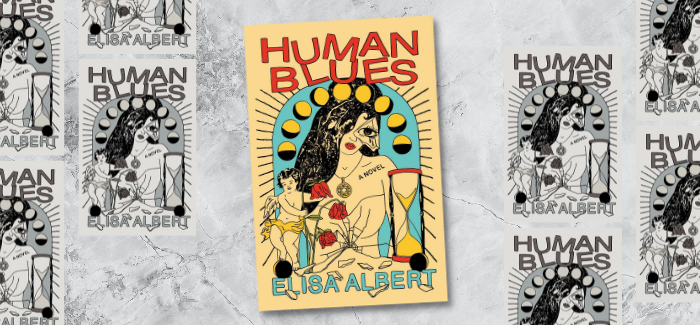Books
Fiction
‘Human Blues’ Tackles Infertility Through Dark Comedy

Human Blues
By Elisa Albert (Simon & Schuster)
Ambition, the price of success and the pressures on women to reproduce are the themes of Human Blues, Elisa Albert’s darkly funny, tongue-in-cheek third novel. In her previous books, she developed strong Jewish female characters who buck the norms and follow their own paths, and Aviva Rosner, the protagonist of Human Blues, is no different.
Singer-songwriter Aviva is getting ready to release her fourth album even as she struggles with infertility. She desperately wants a baby with her husband, Sam, but doesn’t trust assisted reproductive technology, which she calls “industrial fertility.” This wariness is unapologetically laid bare in her folk-punk album, which she titles Womb Service. The album is a hit and Aviva enjoys the fame—until listeners’ responses to the album’s message becomes grating and intrusive. Aviva’s obsession and inspiration is real-life Jewish singer-songwriter Amy Winehouse, who passed away in 2011, and she often ruminates on Winehouse’s life to make sense of her own.
Told over the course of nine menstrual cycles, the book is centered on the female body—society’s sexualization and objectification of women as well as the cultural obsession with reproduction and motherhood. Aviva jadedly observes people on social media announcing pregnancies and oversharing fertility struggles, even as she fights her bitterness about her inability to conceive and stubbornly refuses to use modern technology to help. She says to herself, “I’m anti-selling motherhood, I guess. I’m anti-buying motherhood. I’m anti-capitalist motherhood. I’m anti-technocratic motherhood.”
She also grapples with guilt from her mother, who makes sure to expound on the blessings of children (even as she herself is neither warm nor mothering to her own children), and ambivalence over her own needs and desires—the arrival of a baby would impact her ability to go on tour.
Aviva is harsh and provocative. She unabashedly lies about being pregnant for her own gain, and even as she declares her wariness of antibiotics and fertility medications, eagerly ingests weed, edibles and psychedelics. Her refusal to play nice or be anything less than complex makes her an unsympathetic but nevertheless compelling character.
In the end, just like in real life, there are no easy answers to the decisions she must make. The book revolves around Aviva’s physical body and fertility, but Albert quietly shines in laying bare topics crucial to many women—societal expectations, the push-pull between ambition and parenthood and the question of what it means to truly want to be a mother.
Jaime Herndon is a writer and avid reader. Her work can be found on Book Riot, Undark, Kveller, Motherly and other places.










 Facebook
Facebook Instagram
Instagram Twitter
Twitter
Leave a Reply